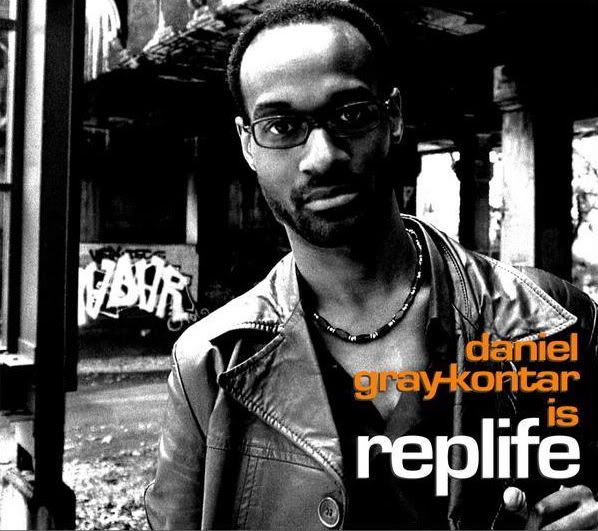 One of my favorite MCs, REPLIFE, a.k.a Daniel Gray-Kontar, a Cleveland-born MC, poet, publisher, award-winning journalist, youth mentor, and advocate for public education is one of the most honest and inspiring artists I have encountered in a while. A heavy-hitter in the international broken beat/hip-hop scene, Replife is not only "one of the freshest MC's out there" (you can believe it if BBC Radio host, Gilles Peterson says it:), but also a renaissance man with a strong grassroots background. For Replife, "keeping it real" is not just an overused line, but a way of translating rhymes into action.
One of my favorite MCs, REPLIFE, a.k.a Daniel Gray-Kontar, a Cleveland-born MC, poet, publisher, award-winning journalist, youth mentor, and advocate for public education is one of the most honest and inspiring artists I have encountered in a while. A heavy-hitter in the international broken beat/hip-hop scene, Replife is not only "one of the freshest MC's out there" (you can believe it if BBC Radio host, Gilles Peterson says it:), but also a renaissance man with a strong grassroots background. For Replife, "keeping it real" is not just an overused line, but a way of translating rhymes into action.As a journalist, he has been published nationally in The Village Voice, The Source, The Philadelphia Weekly, and Cleveland’s Free Times, for which he served as an associate editor and columnist. In 2003, he founded Urban Dialect – a monthly alternative magazine blending the interest of literature, politics, culture and community. As a poet and spoken word, RepLife spread his talent around in various publications such as Bum Rush The Page, A Def Poetry Jam, Spirit and Flame, and the Contemporary African Poets, was chosen as the 1994 national poetry slam co-champion, and he was also one of the featured artists on the sound recording for Grand Slam: The Best of the National Poetry Slam Volume One.
His new solo album, The Unclosed Mind is dropping on March 24th, and you can purchase it on iTunes, Amazon.com, Best Buy, and at independent record stores the world over. With international collaborators on board such as, Noni Limar (Sa-Ra Creative Musical Partners), Deborah Jordan (Silhouette Brown), jazz singer Ki Allen and rising Swedish star Kissey Asplund who lent their vocals to the project, and Mark de Clive-Lowe, Dego (of 4Hero), Kaidi Tatham (of Bugz in the Attic), Atjazz, Don-Ray, RLP, Archetyp, and a host of others who contributed production to the album, this album is a true gem. I highly recommend it.
Following is my convo with Replife about his first encounter with "Sucka MCs" as a child, the challenges of juggling life as an MC, PhD candidate, journalist and youth mentor, and about the value of taking risks.
Lichiban: Where did you grow up? Where do you live now?
Replife: I was born and raised in Cleveland, but I currently live in the San Francisco Bay area. It’s funny how you don’t realize how much your view of the world is shaped by the place you’re from until you leave it. No matter where I go, Cleveland will always be with me. I have a serious love/hate relationship with the Land because it is such a difficult place to be if you have any desire to be progressive. My album, “the unclosed mind” is dedicated to the people that have made the decision to stay in Cleveland and make it a better place, and I have a lot of admiration for the everyday people back home. They are tough, no nonsense people who work very hard everyday and never ever quit. As far as the Bay Area is concerned, I’m a new transplant here, and I’m still wrapping my brain around this new environment. But the people here have been real warm and open to me.
L: Most artists I know started their “career” in their childhood? When did your love of making music surface?
(Laughs). Well … there’s kind of a double answer to that question, really. Since my writing is so much a part of my “instrument” I’d have to start there. I like to say that my love of writing developed out of being a “bad” kid. I would do all kinds of dumb kid stuff, just because I could. I was an only child raised by my mom, so between when I got out of school and my mom getting off work, there were a couple of hours each day to get into all kinds of madness on the streets. Needless to say, I was grounded a lot. So it gave me a lot of time to sharpen my writing from the prison cell that was my room. It gave me that healthy dose of hating the world that all poets need (laughing). Anyway … I was already writing poems as early as eight years old. But by the time I was in junior high school, I heard “Sucker MC’s” for the first time. It was a wrap. I had to rime. So, while all the other kids where breaking, DJing, and painting; I was one of the first kids riming as my contribution to hip-hop culture in the neighborhood. I guess cats thought I was pretty good at it, so it wasn’t long after that before I started recording in the basement. It just had to go down.
L: You are an accomplished journalist, poet, an active musician, and also pursuing your PhD. Are you able to integrate these distinct projects into a holistic life path? How do you find time for everything?
R: (Laughs again). It’s definitely not easy. And yeah, it’s definitely a lot on it! There are a lot of sacrifices I’ve had to make along the way. One of them is that I really don’t have time to nurture a relationship with a female love interest because I’m so busy. Most of my time is spent doing (or thinking about) those things you mentioned; so it’s difficult for a woman to accept that she’s going to have to be second (or even third) in my life right now, and I don’t think its fair for me to ask someone to do that. So, yeah, it means that I’ve had to make decisions about what’s really most important to me; and what’s most important is my connection to the creative source. I connect with the creative source by working with youth, making music that uplifts people’s spirits, and by continuing to research and write prose about how to bring people into a greater understanding of each other in our shared world. All of this is – not to sound cliché – but all of this is “God’s work.” And I’m thankful to have been given the third sight to recognize this very early in my life.
L: You have collaborated with a lot of future soul/broken beat artists in the past. You guys clearly are the key figures in shaping the movement. How would you describe the genre?
R: I think that by our very nature, human beings look to the future. For example, whenever we speak, we are drawing from the past, and we are speaking in the present. But our speech truly resides in the future because we are anticipating a response of some kind to what we are saying. So, from that standpoint, I look at future music as being the present utterance we’re delivering as musicians in anticipation of the next frontier. We live in an increasingly globalized world, and that globalization impacts us politically, culturally, economically, and spiritually. All of the musicians involved in making this style of music are all very global-minded. And so, I think everybody that’s a part of the future soul/broken beat movement realizes this spirit of the times. It’s a fusion of past musical influences and current technology in the interest of eliciting a response from soulful people. And when I say “soulful” I’m not speaking in terms of “black” or “R&B” music. I’m talking about the souls of the “tuned in” people living in this time. This is my take on it, but I’m sure others will have a very different one.
L: Your new LP, The Unclosed Mind, is dropping this month. Tell me about the record a little bit. What was the concept behind the album, and whom did you work with? Where can we get hold of it?
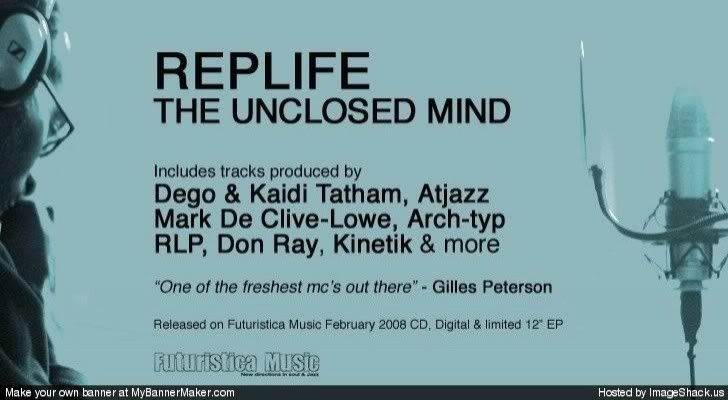 R: Well, for me, there is a difference between an open mind and an unclosed mind. I think we are all born into this world with an open mind. But as we continue experience life, our minds very naturally get more closed due to our natural inclination to discriminate and to put things into boxes. We tend to put boxes and labels on the music we listen. We say “this is hip-hop, this is soul, this is rock,” and so forth. This album is challenging our preconceived notions of what hip-hop music is. And it really took a lot of courage for me to release this kind of an album as a debut, because the record is challenging listeners to have an unclosed mind when listening. But it was a record I had to release, because I think that music is one of the primary ways that we connect with each other. So if we can unclose our minds to music, we can unclose our minds with respect to a number of other things socially-speaking. That’s the whole concept behind the recording. I’m really proud to have worked with musicians from all over the world on this record. Mark de Clive-Lowe, Dego (of 4Hero), Kaidi Tatham (of Bugz in the Attic), Atjazz, Don-Ray, RLP, Archetyp, and a host of others contribute production to the album. Then, Noni Limar (Sa-Ra Creative Musical Partners), Deborah Jordan (Silhouette Brown), Kissey Asplund, and jazz vocalist Ki Allen all contribute vocals to the record. This record is truly a global effort with artists from Japan, Sweden, London, Los Angeles, New York City, Montreal, and of course, Cleveland. It’ll be released on March 24th, and people can purchase it on iTunes, Amazon.com, Best Buy, and at independent record stores the world over. All praise due.
R: Well, for me, there is a difference between an open mind and an unclosed mind. I think we are all born into this world with an open mind. But as we continue experience life, our minds very naturally get more closed due to our natural inclination to discriminate and to put things into boxes. We tend to put boxes and labels on the music we listen. We say “this is hip-hop, this is soul, this is rock,” and so forth. This album is challenging our preconceived notions of what hip-hop music is. And it really took a lot of courage for me to release this kind of an album as a debut, because the record is challenging listeners to have an unclosed mind when listening. But it was a record I had to release, because I think that music is one of the primary ways that we connect with each other. So if we can unclose our minds to music, we can unclose our minds with respect to a number of other things socially-speaking. That’s the whole concept behind the recording. I’m really proud to have worked with musicians from all over the world on this record. Mark de Clive-Lowe, Dego (of 4Hero), Kaidi Tatham (of Bugz in the Attic), Atjazz, Don-Ray, RLP, Archetyp, and a host of others contribute production to the album. Then, Noni Limar (Sa-Ra Creative Musical Partners), Deborah Jordan (Silhouette Brown), Kissey Asplund, and jazz vocalist Ki Allen all contribute vocals to the record. This record is truly a global effort with artists from Japan, Sweden, London, Los Angeles, New York City, Montreal, and of course, Cleveland. It’ll be released on March 24th, and people can purchase it on iTunes, Amazon.com, Best Buy, and at independent record stores the world over. All praise due.L: Many of your lyrics touch on issues having to do with social justice, civil rights, peace or other community-related matters and you are also a community activist, right? What do you think are the most relevant issues today and how could us, artist, do more to address those issues?
L: Those are really dope questions. Well, let me answer your first question very directly. The most critical issues in my mind are the miseducation and depolitization of young people on the one hand, and environmental justice issues on the other. Truly, you could say that these are one issue; and that issue is the misappropriation of power between the haves and the have-nots.
Answering your second question is a little more complicated. I have really made a lot of my life’s decisions based upon the question “what can I do?” I’ve answered that question by deciding to try to act — in as responsible a way I can — on local and global levels. On the one hand, I act locally by working with young people where I live. That’s really important to me. Even whenever I tour, it’s got to be part of the deal that some time is spent at a school or community center talking with young people. I don’t ask for a bunch of stuff on my rider. I just ask for the promoter that’s bringing me into town to make sure that they connect me to young people or to a strong youth organization. Earlier, I talked a little bit about globalization, and the fact that our world is getting smaller. So, I try to work on a global level by composing lyrics, poems, and articles that reflect our commonalities in the interest of engaging in the process of re-humanization. I think a large part of the reason that we wage and support wars with such relative ease is that we’ve done a pretty good job of dehumanizing each other. And in many instances, we do it quite unconsciously. I kind of shy away from talking about what I think other artists should do, though. I think everyone has their own path. But this is how I have chosen to act, based on my personal belief-system.
L: What drives you? What makes your creativity flow?
R: Beauty makes my creativity flow. A beautiful scene on the street. Beautiful people on the train. A track that’s so beautiful that it gets all in my body. A beautiful woman. And even our struggle is beautiful. To watch so many people struggle for basic survival – to find the strength to make it happen in the face of overwhelming odds. Man … it’s nothing to romanticize. But there’s still something very beautiful about the human will to survive.
L: What was the most beautiful moment in your music carrier?
R: Oh wow. You are asking some great questions. Well … I’d have to say that it was the period of time when I made my first trip to London in 2006. I had an opportunity to work with people that I had admired from a distance for a very long time. Working with Dego was one of the best experiences of my life. That dude is nice and easy in the studio. A true professional, a true artist, and a solid, solid human being. Then, there was working with and really creating a bond with my labelmates at Futuristica. Deborah Jordan, Simon Scolfield, Caroline Marks from Electric Conversation, Rise, Soul Persona, Marc Rapson, Cecilia Stalin … all of these people are truly my brothers and sisters. Meeting and building with them was more than about music. It was about connecting with soulmates. Then, there was working with Mark de Clive-Lowe (my man, Mashi!!) and the incredible avant-garde jazz pianist Robert Mitchell. That two-week period of recording and performing was the most beautiful experience of my life.
"If you don’t take risks, you can’t grow, and if you don’t grow you can’t inspire others to feel – and that’s what art is about at the end of the day. The art lives through us. It dies through us. It is us. And if taking risks is what makes us grow, it’s ultimately risk-taking that gives life to the art and life to the self."
L: What should we expect from you in 2008?R: A lot. You can look for the follow-up album to “the unclosed mind” almost immediately. It’s an album I actually recorded between 2004 and 2006 called “the book of job.” That record will be out by the end of 2008, also on Futuristica, which is rapidly being called “the Stones Throw of London” by some people. But there’s been a lot of side projects as well. I appear with Belgian producer Cris Prolific on a track for his album, then there’s a couple of songs on Don-Ray’s forthcoming album. Mark de Clive-Lowe and I recorded some songs that will appear on an EP we’re releasing together this year. And there’s a little talk of a possible remix album for “the unclosd mind.” There are so many collaborations happening for release this year, it’s hard to list them all here. But I’m excited about each and every one of them. I’ll also be touring a lot more than ever. I also plan on getting back into the newsroom a bit this year. So there will be more articles penned by Daniel Gray-Kontar once again. And look out for my students! I work with some amazingly talented young people in Oakland … so you may hear about a project coming from them, as well.
L: What would you say to those who are contemplating switching life path in order to try to make a living out of their real passion — let it be art, journalism, or music —but are discouraged by the risks involved in choosing a creative journey?
R: One of the scariest moments of my life came when I leapt without a parachute to start a magazine. I knew that it was going to be tremendously difficult financially and otherwise. And it was. I got kicked out of my apartment, it created serious problems with the woman I was seeing at the time, and it took a toll on me health-wise. Ultimately, the magazine didn’t survive, but it was one of the most important things I’ve ever done because it made me grow in ways that I can’t begin to express in the time and space we have here. I mention this to simply say that the nature of being an artist or an intellectual is taking risks. If you don’t take risks, you can’t grow, and if you don’t grow you can’t inspire others to feel – and that’s what art is about at the end of the day. The art lives through us. It dies through us. It is us. And if taking risks is what makes us grow, it’s ultimately risk-taking that gives life to the art and life to the self. So at the end of the day, the question is … am I going to live or survive? And that’s a very personal question that each individual in transition has to answer and sort through between themselves and the creative source.
L: Thank you!





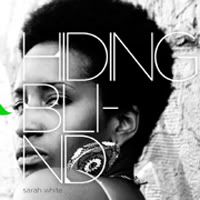
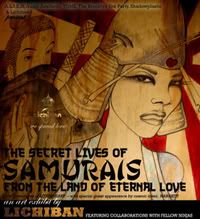

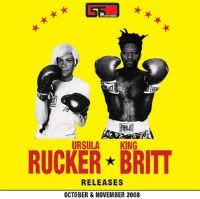
No comments:
Post a Comment